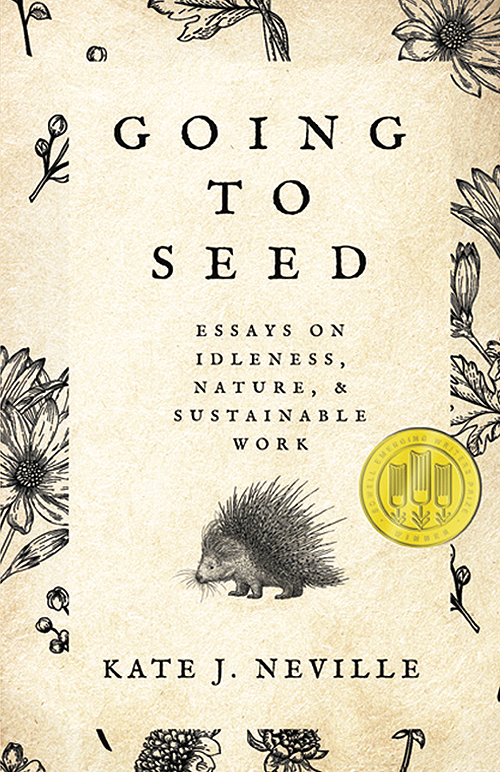Kate Neville has an issue with the phrase “going to seed.”
Derived from the natural act of plants finishing up their life cycle and focusing on producing seed to perpetuate itself, its general usage conjures up images of deterioration or decay.
But in Neville’s mind, “going to seed” means the renewal of life, not the end. And she believes it’s this regeneration that we should be striving to facilitate in the natural world by re-examining how we work.
Going to Seed: Essays on Idleness, Nature & Sustainable Work is a collection of writing that fuses scientific research with literature, poetry and personal reflections to explore our relationship with the natural environment and the concept of sustainable labour.
“This book starts with the question, ‘Whose work are we talking about?’” says Neville, an associate professor cross-appointed between the Department of Political Science and the School of the Environment in the Faculty of Arts & Science.
“Rather than starting with work, I took the opposite approach and thought, ‘What happens if we start thinking about idleness?’”

Neville notes that for just about every environmental problem — as well as social and economic issues — the reaction is always one of acceleration, scaling up, or advancing in some capacity. But what if there’s a solution in stepping back and slowing down?
“The book takes on different ways of thinking about slowing down, and what happens when people engage in idleness in order to let other people do their work, and not just people, but other creatures.”
As the labour of humans often works against the well-being of the natural world, “our work often stops natural processes from happening in the world around us,” says Neville. “But if humans back off, what other work might be able to thrive, whose labours might be able to take up that space?”
Each of the book’s seven essays begins with a natural starting point like a specific plant or an animal such as an owl, fir tree, bear or beaver — something in the natural world impacted by human activity.

From this starting point, the essays touch on different historical philosophies and traditions, like Japanese Zen, Buddhist and Judeo-Christian theories about work and productivity as well as the significance of rest.
“I want to show that it's not just work versus idleness,” she says. “There are lots of ways of thinking about certain moments of work against certain moments of pausing, and what that looks like.”
One essay focuses on beavers and their labour in creating lodges and dams, with the underlying theme of resistance.
“It starts with an aspen tree by the lake that beavers have taken down and used for their lodge,” says Neville. “I use that moment to look at the work of beavers in this world, the intersection of destruction and construction.”
Of course, when beavers build dams, they slow waterways and often flood landscapes. But this is important for them to sustain food sources and habitat, helping a variety of other creatures to flourish thanks to calmer waters.
“But in doing so they flood agricultural lands, they flood roads, and do all kinds of damage to human infrastructure. And people tend to spend a lot of time and effort dismantling beaver dams and rebuilding roads and creating culverts.
“So I look at that relationship, this idea of our work versus the work of beavers, and what the beavers enable by slowing things down, the stillness that enables regeneration, some kind of continued ecological integrity.”
Another essay uses the fable of the ant and the grasshopper as a window for thinking about creativity and the concept of undirected time. To explore the concept of rest, she writes about bear hibernation and delves into the balance between relaxation and production.
Neville was continually inspired by watching wildlife as she wrote much of the book while on sabbatical living with her partner in a remote, off-the-grid cabin near the small town of Atlin, just south of the Yukon-BC border, on the unceded territory of the Taku River Tlingit First Nation.

In this quiet peaceful setting she also thought about her past research on energy usage and transitions, as well as classes she taught at the School of the Environment.
“Much of that work says we need to switch from high carbon to lower carbon forms of energy generation,” she says. “But what often gets glossed over is, why do we need so much energy at all?
“What is all this energy doing? Even if we had low carbon energy, we still would be in moments of environmental crisis, because a lot of what we do with our energy is tearing up the planet. Even without carbon, we're still looking at massive ecological changes.”
Though the book was initially written with her students in mind, Neville feels it would appeal to anyone interested in nature writing, and in the intersection of nature, culture and place.
And though the book offers more questions than arguments or conclusions, she admits there’s an underlying message.
“Our constant productivity or constant amplification of speed, that sense that everything is urgent — I want people to question that from this book,” she says.
“There are urgent social and environmental problems that rightly demand a response. We are in a time of incredible disruption. But idleness can be a response, and not an apathetic or uncaring one. It's really asking, is amplified speed the only option? Can we think about other ways of being?”

